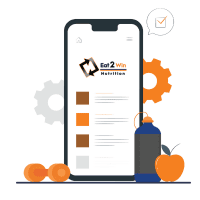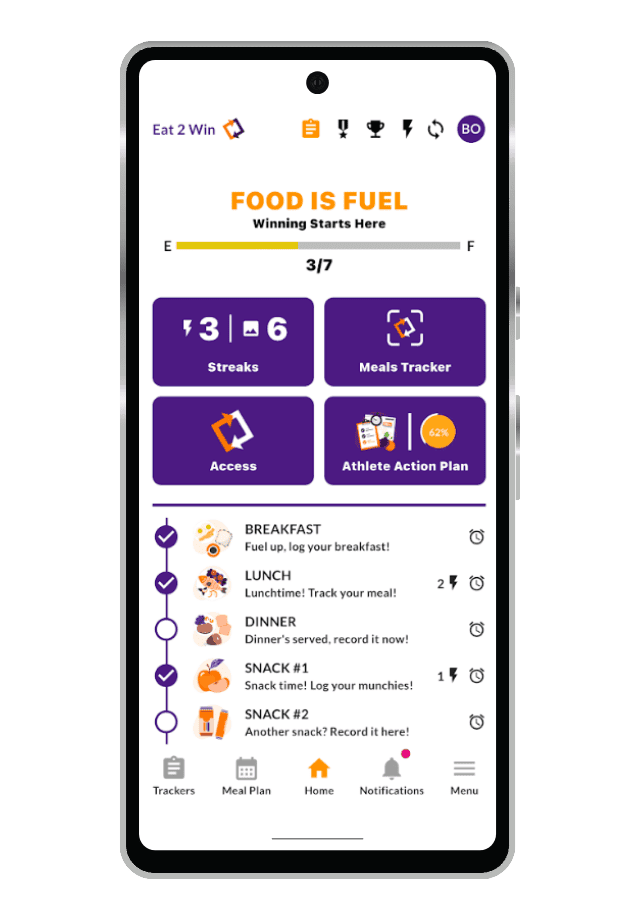Next Level Podcast with Host Tavis Piattoly, MS, RD, LD

Brad Pilon, BS
He received his Bachelor of Science in Applied Human Nutrition and his master's degree in Human Biology and Nutritional Science, where his main area of interest was the effect of short periods of fasting on human metabolism. Brad is one of the worlds most sought after intermittent fasting advocates. His book Eat Stop Eat is the result of this research.
In this episode of the Next Level Podcast, Tavis Piattoly interviews Brad Pilon on intermittent fasting methods, the benefits to intermittent fasting, and intermittent fasting for athletes and how it impacts their athletic performance. Learn the best way to fast as an athlete!
Brad is one of the worlds most sought after intermittent fasting advocates. His book Eat Stop Eat continues to be one of the best-selling books on intermittent fasting on the internet.
He received his Bachelor of Science in Applied Human Nutrition and his master's degree in Human Biology and Nutritional Science, where his main area of interest was the effect of short periods of fasting on human metabolism. His book Eat Stop Eat is the result of this research. Brad has also spent over 7 years working in Research and Development in the sports supplement industry. During this time he helped design multiple clinical trials and create dozens of popular bodybuilding supplements, and is listed as an author on multiple patents involving methods to increase muscle mass and decrease body fat.
Through appearing on national television, speaking at national scientific conferences and his book Eat Stop Eat, Brad has helped millions of people become aware of the amazing health benefits that can be achieved by simply taking an occasional break from eating and by taking a practical approach to nutrition and exercise.
In this podcast you will learn:
1. What is Intermittent Fasting?
2. What methods of fasting more effective than another?
3. Brad’s first experience with fasting.
4. The challenges Brad faced the first couple of times you he tried to fast for an extended period of time.
5. The benefits of intermittent fasting.
6. What happens to our blood sugar and insulin levels during a fast?
7. The Fed and Fasted State.
8. Fasting and Body Fat Percentages.
9. Effects of fasting on hormones (Testosterone and Growth Hormone).
10. How long can we go without eating before our body burns muscle tissue.
11. Fasting and intense weight training. Is it recommended?
12. Fasting for athletic performance. Is it recommended?
13. Fasting for high school or college athlete?
14. If there is there a best approach to fasting?
15. His book “Eat Stop Eat”.
16. Tips for people who would like to try fasting for the first time and how to be successful at it.
Podcast Transcript
0:00 Tavis Piattoly Introduction
2:27 What is Intermittent Fasting?
- Fasting: the purposeful decision to not eat
- Intermittent fasting: fasting occasionally/every once in a while. Intermittent fasting includes brief, small periods of fasting, broken up by periods of eating like a normal human being.
3:40 What methods of fasting are more effective than another?
- This comes down to personal preference. Brad is a fan of 24 hours because it fits most people’s days and it's an easy number to remember. Most of the startling changes, the ones we're interested in (fat burning, etc.), happen in that 12 to 24 hour range, therefore, whatever you can do within that range is best.
4:57 Brad’s first experience with fasting.
- Brad started looking into fasting for his graduate research, studying the effect of short periods (12-72 hours) of fasting on human metabolism. He first tried a 72 hour, or three day, fast, which he noted was horrible. Some people can do it, but for him, it was a giant social commitment. In addition to not centering your day to day activities around food, you’re also turning down the social aspect of food for three days.
- This was a good experiment for Brad because it made him realize that fasting has to be done in a way that fits in people’s lifestyles. He realized that he couldn’t recommend the 72 hour fast to others.
8:11 The challenges Brad faced the first couple of times he tried to fast for an extended period of time.
- The first challenge for Brad was the mental aspect of it and thinking he was doing something wrong. Although Brad had done his research, he found it difficult to not think about his metabolism crashing or losing muscle.
- Another challenge wasn’t dealing with hunger, but instead dealing with wanting to eat. With intermittent fasting, Brad had to break the cycle of habitual eating.
11:07 The benefits of intermittent fasting.
- Physiological benefits:
- Fat burning: This is measured through the amount of oxygen you breathe in versus the amount of carbon dioxide you breathe out (RQ). Within the first 12-14 hours of fasting, individuals have greatly increased the amount of fat burning. This can also be measured through fat in your blood, which is being oxidized as a fuel by the muscles and organs.
- Improved insulin sensitivity
- Decreased inflammation
- Improved disease markers
- Mental benefits:
- Changes the way individuals view eating when not fasting: Lessens previous rituals around food, such as needing a snack to hold you over, having coffee at this time, having a poptart before a giant squat workout.
- Long-term fasting: Noticing that having a headache or stomach ache may not be related to food
15:58 What happens to our blood sugar and insulin levels during a fast?
- After eating, the food is going to be digested. Generally, there is a three hour window where insulin is high. Then, that food starts to disappear. The nutrients available from that food are now being used up and your insulin levels are starting to decrease. As your insulin levels slowly decrease, your growth hormone levels begin to increase. That combination starts to tell your body that there's not much here, let's pick up the free fatty acids and use them as fuel. By preferentially using them as a fuel, you start to preserve your blood glucose levels.
- The body has two reserves for glucose - your liver and your muscle. The liver will release glucose to keep blood levels stable. The muscle has their own private supply of glycogen.
- Over a 24 hour fast, blood glucose levels are relatively stable as long as you're not diabetic or have a blood glucose issue. By the end of the 24 hour fast, typically your liver glucose is only down to about a third of what it was before you started fasting, therefore it takes a significant amount of fasting to wear that down.
20:53 The Fed and Fasted State.
- When you eat, the food is digested and is used as a fuel. If you were to be burning fat at that time, it's probably the fat from your cheeseburger. There's no reason for you to be working away at your body fat stores when you have this other fat available. Same goes for glucose and amino acids. If food is not there, then you have to find something else, and that's when your body turns your body fat.
22:22 Fasting and Body Fat Percentages.
- While there isn’t hard data on this, the collection of data suggests that the leaner you are, the less often or the shorter of a fast was optimal.
- The goal is not 0% body fat. When you get to a point where you're trying to maintain that level of body fat, you can still fast for 24 hours once every 10 or 14 days.
24:37 Recommendations for males vs. females
- We've known for a long period of time that female athletes have their own set of issues in terms of low body fat and high exercise output. For males, 10% body fat is fine. For females, take that number and double it (20%).
- Females at 25-30% body fat trying to get down on a 24 hour fast is not an issue. When we get to 16, 17, 18% body fat + 600-700 calories from activity, there may be some worry.
8:10 Effects of fasting on hormones (Testosterone and Growth Hormone).
- Growth hormone:
- Increases with fasting
- Testosterone:
- By the end of a 24 hour fast, you will not see a decrease in testosterone
- You may see a little blip in the middle because your testosterone levels have changed throughout the day
- Insulin:
- Decreases with fasting
- Overall, exercise with not enough calories, regardless of fasting, tends to be what triggers negative hormonal effects.
33:47 How long can we go without eating before our body burns muscle tissue?
- Research shows that women in a 5 month calorie deficit who were weight training did not lose significant levels of muscle. The key to that statement is that they also didn't gain. Weight training seems to be one of the key components to preventing you from losing muscle mass even during prolonged periods of fasting.
37:23 Fasting and intense weight training. Is it recommended?
- Brad has seen a lot of people who enjoy training fasted. He doesn’t think the pre-workout calorie load is essential, but instead thinks that the overall calorie intake is the most important part.
- Training and fasting should both be able to flow together in a way that's optimal.
40:12 Fasting for athletic performance. Is it recommended?
- Three things to consider include body fat levels, overall calorie intake, and calorie expenditure. If body fat is higher for that specific athlete, and workload is consistent, using a fast is a way to alter the calorie intake. If calorie intake is low, and body fat is low, and they're hitting a high period of exertion, the question would be why are we thinking about fasting at this time?
44:05 Fasting for high school or college athletes?
- Fasting is an incredibly effective way to lose fat, however it’s not the only way to do that. As a coach, it’s important to be aware of what you're saying versus what they're hearing. With fasting, you don't have to call it fasting. You can work with your linebackers to not have as many snacks in between meals and you're accomplishing the same thing. Typically, giving every single athlete the same advice isn’t going to work.
46:40 If there is a best approach to fasting?
- Previously, Brad was doing a 24-hour fast once or twice a week. Pre-kid, 7:00 PM to 7:00 PM was perfect. Then, he realized it wasn’t working. He was resenting it, and all he had to do was realize that his lifestyle had changed. There is no perfect way to fast, and there are many ways that you can adapt your diet to suit what you're doing.
49:40 His book “Eat Stop Eat”.
- Brad wanted to take the fasting work and make it available to everybody online. One thing he really likes about the online world is the interaction between you and the person reading your book. When Brad gets feedback, he can go back to his research, add more explanations, change it up and put it back up online.
- Brad’s book can be purchased at eatstopeat.com
- Twitter: BradPilon
- Facebook: BradPilon
53:39 Tips for people who would like to try fasting for the first time and how to be successful at it.
- Water intake
- Stay busy
- Awareness of trying it out
56:00 Tavis Piattoly Closing Remarks
Eat 2 Win Nutrition App
Fuel the Champion Within

Trackers
Stay on target with cutting-edge trackers that monitor every step of your journey, ensuring you never miss a beat.

Meal Plan Guides
Simplify your nutrition with easy-to-follow, personalized meal plans that fuel your performance.

Gamification
Stay motivated and engaged by earning rewards and climbing leaderboards as you hit your fitness and nutrition goals.

Access a Sports Dietitian
Get expert guidance and personalized support from a certified Sports Dietitian whenever you need it.

Personalized Programs
Unlock your full potential with personalized programs meticulously crafted to match your unique lifestyle and fitness aspirations.



